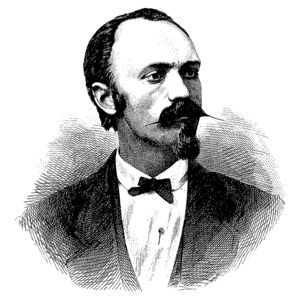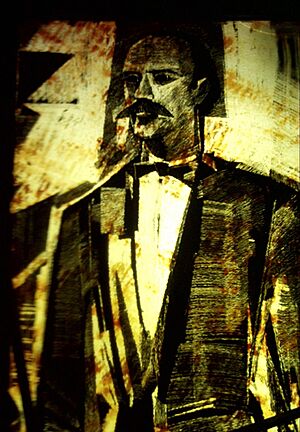Calixa Lavallée facts for kids
Quick facts for kids
Calixa Lavallée
|
|
|---|---|

An illustration of Lavallée from 1873
|
|
| Born |
Calixte Paquet dit Lavallée
December 28, 1842 Verchères, Province of Canada
|
| Died | January 21, 1891 (aged 48) Boston, Massachusetts, U.S.
|
| Resting place | Notre Dame des Neiges Cemetery, Côte-des-Neiges–Notre-Dame-de-Grâce, Montreal |
| Nationality | British Empire (Canadian) |
| Occupation | Musician and composer |
| Known for | composing the music of the Canadian national anthem "O Canada" |
| Spouse(s) |
Josephine Gentilly
(m. 1867) |
| Military career | |
| Allegiance | |
| Rank | |
| Unit | |
| Battles/wars | American Civil War |
Calixa Lavallée (born December 28, 1842 – died January 21, 1891) was a talented musician and composer. He was French-Canadian and also spent time in the United States. He is most famous for writing the music for "O Canada." This song became Canada's official national anthem in 1980.
The Canadian Parliament voted to make "O Canada" the national anthem. They also changed some of the English words in 1980 and again in 2018. However, the original French lyrics and the music by Lavallée have stayed the same since 1880.
Contents
Calixa Lavallée's Early Life and Music
Calixa Lavallée was born as Calixte Paquet dit Lavallée. His parents were Jean Baptiste Paquet and Charlotte Valentine. He was born near Verchères, a village close to Montreal in what was then the Province of Canada. This area is now the Canadian province of Quebec.
His family had a long history in Canada. His father, Jean Baptiste, was a blacksmith and a musician. He was also a luthier, someone who makes stringed instruments. Calixa's father even worked for a company that built pipe organs.
Calixa started learning music from his father. By the age of 11, he was already playing the organ. He also studied music in Montreal with other teachers like Paul Letondal.
Becoming a Professional Musician
Lavallée gave his first public performance in Montreal in 1859. He played at the Theatre Royal. Later that year, he joined a traveling music group called the New Orleans Minstrels. He played the violin, cornet, and piano.
With this group, Lavallée traveled all over the United States. This was in the years before the American Civil War began.
Serving in the Civil War
On September 17, 1861, Lavallée joined the 4th Rhode Island Infantry Regiment. He was a private and played music in the army band. He served in the military until August 16, 1862.
After his military service, he went back to touring with the music group. He continued to perform until late 1863. Then, he returned to Montreal.
Life as a Composer and Teacher
From 1863 to 1866, Lavallée was very busy. He organized concerts, wrote new music, and taught music lessons. In 1866, he went back to the United States and stayed there until 1872.
In December 1867, he married Josephine Gentilly in Massachusetts. She was an American woman.
After spending two years in Paris, France, Lavallée came back to Montreal in July 1875. He kept performing and composing music. He lived in Montreal and Quebec City. He worked as a pianist, organist, and music teacher. He also led orchestras and opera shows. He performed in places like the Montréal Academy of Music. One of his students was the composer Alexis Contant.
Composing "O Canada"
In 1880, the Lieutenant Governor of Québec, Théodore Robitaille, asked Lavallée to write a song. This was for Saint-Jean-Baptiste Day, a special holiday. Lavallée composed the music for "O Canada." The words were a patriotic poem written by Adolphe-Basile Routhier.
After facing some money problems in Canada, Lavallée moved back to the United States. Later in his life, he supported the idea of Canada and the U.S. working more closely together.
His Final Years
In his last years, Calixa Lavallée was the choirmaster at the Cathedral of the Holy Cross in Boston. He died in Boston in 1891 without much money.
Years later, a music director from Montreal, Joseph-Laurent Gariépy, worked to bring Lavallée's remains back to Canada. In 1933, Lavallée was reburied at Côte-des-Neiges Cemetery in Montreal.
What He Wrote
Calixa Lavallée wrote many musical pieces. Here are some of his selected works:
- Peacocks in Difficulties/Loulou, a funny opera
- The Bridal Rose Overture, a short opera
- The King of Diamonds, an overture
- L'Absence, a song with lyrics by Remi Tremblay
- L'Oiseau Mouche, a piano piece
- La Rose Nuptiale, for brass instruments
- Une Couronne de Lauriers, a piano piece
- Le Papillon (The Butterfly) Étude de Concert for piano
- La Patrie (1874)
- Marche funèbre, a funeral march
- Violette, a song
- "O Canada", the national anthem
- The Widow, a funny opera
His Legacy Today
Calixa Lavallée is remembered in many ways.
- The village of Calixa-Lavallée, southeast of Montreal, is named after him.
- A professional training school in Quebec, Calixa-Lavallée, also carries his name.
- Several roads and streets are named to honor Calixa Lavallée:
- Avenue Calixa-Lavallée in Shawinigan, Quebec.
- Avenue Calixa-Lavallée in Quebec, Quebec.
- Rue Calixa-Lavallée in Magog, Quebec.
- Rue Calixa-Lavallée in Boucherville, Quebec.
- Rue Calixa-Lavallée in Repentigny, Quebec.
- Rue Calixa-Lavallée, a street near Lafontaine Park in Montreal, Quebec.
- Avenue Calixa-Lavallée in Laval, Quebec.
- Calixa-Lavallée Privée, a small street on the University of Ottawa campus.
See also
 In Spanish: Calixa Lavallée para niños
In Spanish: Calixa Lavallée para niños
- Calixa-Lavallée Award
- Music of Canada
- List of Canadian composers
- Canada in the American Civil War
 | Audre Lorde |
 | John Berry Meachum |
 | Ferdinand Lee Barnett |


